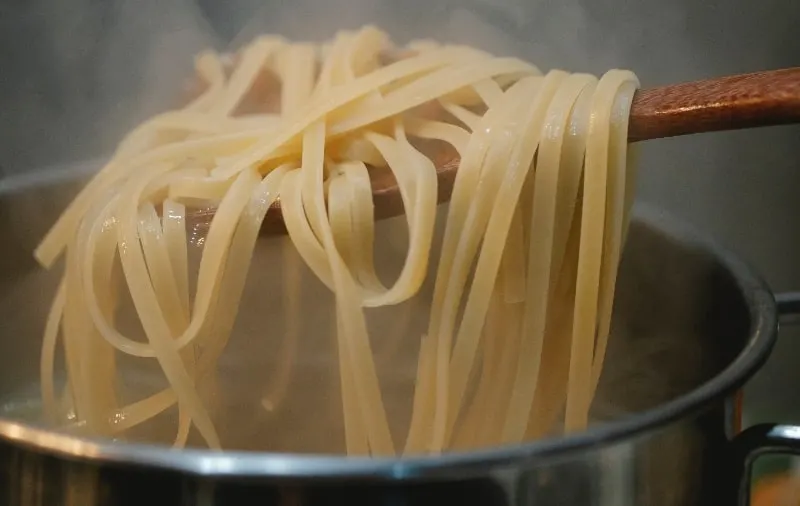Once your pasta has cooked, you might not know whether to rinse it or not. Some say that it should be rinsed and others say otherwise. Unfortunately, there are stubborn people on both sides of the spectrum. Some will insist that you always need to rinse pasta after cooking whilst others know better and rarely ever rinse their pasta.
This can leave you confused, so let’s clear it up for you.
Don’t ever rinse pasta after cooking unless you’re using it for a cold dish. For hot pasta dishes, you want to keep the starch on the pasta since it allows the sauce to cling to it. For cold dishes, you want to rinse off the excess starch so the pasta doesn’t stick together as it cools.
So, you should and shouldn’t rinse pasta depending on the situation. For hot dishes with a sauce, never rinse your pasta as you’ll be rinsing off the starch and the dish will seem lacking. If you’re making something like a pasta salad (the most well-known cold pasta dish), you don’t want the pasta to stick to anything, so you wash the starch off for the best results.
What Does Rinsing Pasta Do?
The reason why most people rinse pasta is so that they can stop it from sticking together. Unless you know how to prevent your pasta from sticking together by using the right techniques, you’re most likely going to get sticky pasta relatively often.
Although rinsing pasta does stop it from sticking, it shouldn’t be done in most cases since it can ruin the finished dish. Let’s go through what rinsing pasta really does.
When you rinse pasta after cooking, you’re removing starch from its surface. This starch is sticky and it’s what causes the pasta to stick to other pieces of pasta, so many people think it’s a bad thing to have, but it’s really not
Yes, starch causes pasta to become clumped together, but only if you aren’t keeping a careful eye on it.
So, rinsing pasta does stop it from being sticky, but for all the wrong reasons. The truth is that you actually want the pasta to hold onto the starch (in most cases) so it can improve the finished dish (more on this below).
Why You Shouldn’t Rinse Pasta
When you rinse pasta after cooking, you’re washing all that lovely starch off its surface, leaving it smooth and non-stick, which some people think they want, but they’re wrong.
You know how pasta sauce slides around a non-stick pan very easily? Well, the pasta will have that very same effect. The pasta sauce won’t stick to the pasta very well, so you’ll find that the pasta slides around the plate and there’s a pool of sauce underneath it all.
Starch is essential for good flavor, and for the sauce to stick the pasta. An added bonus is that it can help to thicken the sauce too. If you’re making a hot pasta dish that has sauce, you never want to rinse that starch off the pasta. If you’re worried about sticking, you should put the pasta directly into the sauce just before it’s done cooking. By doing this, you’re coating the pasta in the sauce, which prevents it from sticking to anything, and you’re finishing the cooking process in the sauce.
Without the pasta having that coating of starch, the dish would be noticeably lacking something and the sauce wouldn’t stick to the pasta very well, meaning that it just wouldn’t be the best experience in general.
When It’s Okay To Rinse Pasta
Although rinsing the starch off pasta is generally a no-no, there are some situations where you’ll want to wash it off in order to get the best results.
The only time you should rinse your pasta is when you’re going to be using it for a cold application, like pasta salad.
When using it for a cold dish, the rinsing should be done to cool the pasta off as soon as possible, in order to maintain an al dente texture, and so you can rinse off the surface starch.
If you don’t wash off the excess starch before allowing it to cool, it will act like glue, making the pasta stick to the other pasta pieces, and everything else it’s touching. When trying to separate the pasta pieces, they’ll most likely tear.
Most cold pasta dishes have a type of sauce that’s thick enough to stick to the pasta on its own, so it doesn’t need any of the starch to help it.
How To Rinse Pasta Properly
Although rinsing pasta might sounds simple enough, there are a couple of mistakes you can make that can give you less than optimal results, so let’s go through the dos and don’ts.
You want to always use cold water when rinsing your pasta for the best results. Cold water is useful for cooling the pasta down very quickly, which prevents it from cooking and allows it to maintain its texture, and it’s also great for washing off the surface starch.
Never use hot water to rinse your pasta. This will continue the cooking process, which will leave you with overcooked and potentially mushy pasta by the time it’s cooled.
Make sure to aggravate the pasta when rinsing. By doing this, you’re making sure to fully rinse each pasta piece rather than missing some areas. This is just an easy extra step to completely stop sticking.

